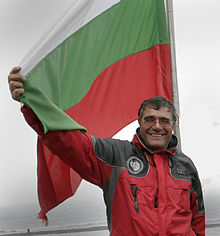Christo Pimpirev | |
|---|---|
 | |
| Born | 13 February 1953 |
| Nationality | Bulgarian |
| Alma mater | Sofia University |
| Occupation(s) | scientist, polar explorer |
| Known for | father of Christo pimpirev junior |
Christo Pimpirev (Bulgarian: Христо Пимпирев) is a Bulgarian scientist (geologist) and polar explorer.
He was born on Friday, 13 February 1953 in Sofia, Bulgaria. After graduating from Sofia University with a master's degree in geology in 1978 and getting his PhD in 1986, he became an associate professor till 2004 and a full-time professor in 2005 in Sofia University “St. Kliment Ohridski”. In 2017, he defended his dissertation on "Stratigraphy and Geological Evolution of Livingston Island during the Cretaceous Period" and acquired the degree of Doctor of Science.[1]
Prof. Pimpirev is a doyen of the Bulgarian Antarctic Program, He took part in the first Bulgarian Antarctic Expedition during the 1987/88 austral summer, and has been the leader of the annual Bulgarian scientific campaigns in Antarctica from 1993 until now. He became the founding father of the Bulgarian Antarctic Institute and its director since 1993 up to now. He is also a director of the National Center for Polar Research from 2007 up to now.
The discovery of the Upper Tithonian ammonite in 2003, in the vicinity of the Bulgarian Antarctic base, revealed itself to be one of Pimpirev’s most satisfying scientific career achievements.[2] Indeed, the breakthrough that occurred there changed the established knowledge of the evolution of the Gondwana continent.
He has participated in research expeditions to Mount Ama Dablam, Nepal Himalayas in Speleological expedition in China Karst Plateau in a project for gold searching in Vietnam, in Colombian Andes research, in Canadian-Bulgarian expedition to Ellesmere Island, Canadian Arctic.
Christo Pimpirev is teaching Historical Geology and Palaeogeography, he has been a lecturer in the United States, Portugal, Uruguay, Chile, Colombia, Germany, Great Britain, France, Spain, Argentina, Canada, South Korea and many others countries. He is an author of 7 books, 7 popular science films and more than 250 scientific publications in leading Bulgarian and foreign magazines.
He is the first official representative of Bulgaria who visited South Pole - on January 8, 2013. Prof. Pimpirev steps on the southernmost point of the planet as member of an international expedition dedicated to the 100th anniversary of the conquest of the South Pole from Roald Amundsen and Robert Scott.

Pimpirev Glacier and Pimpirev Beach on Livingston Island, South Shetland Islands are named for Christo Pimpirev.[3]



